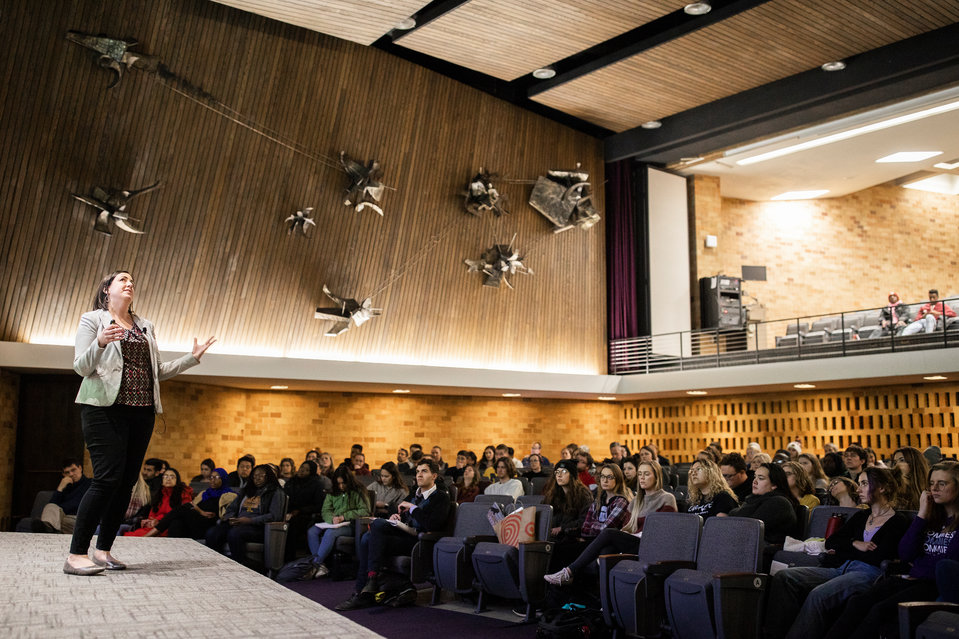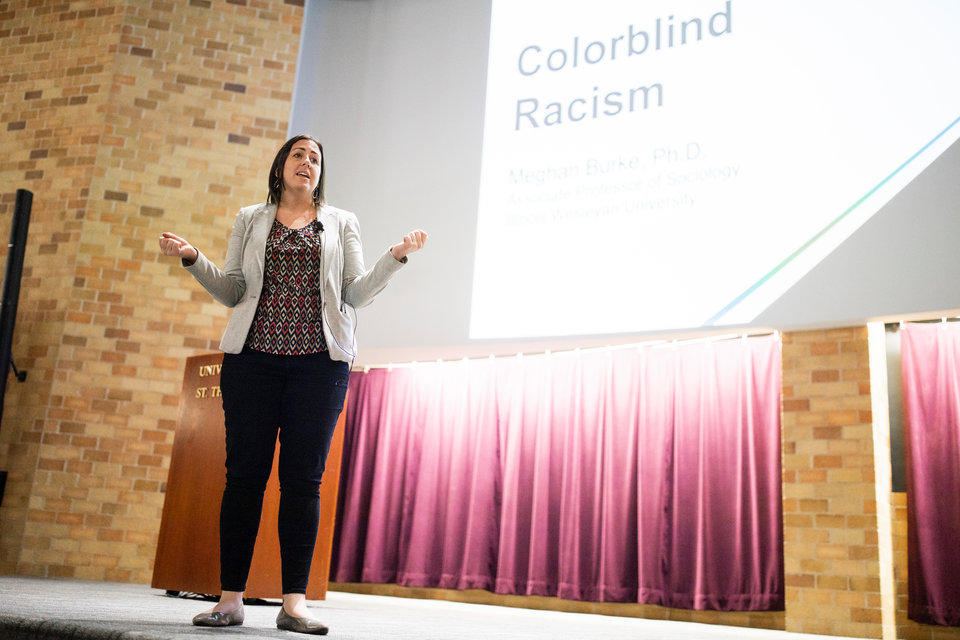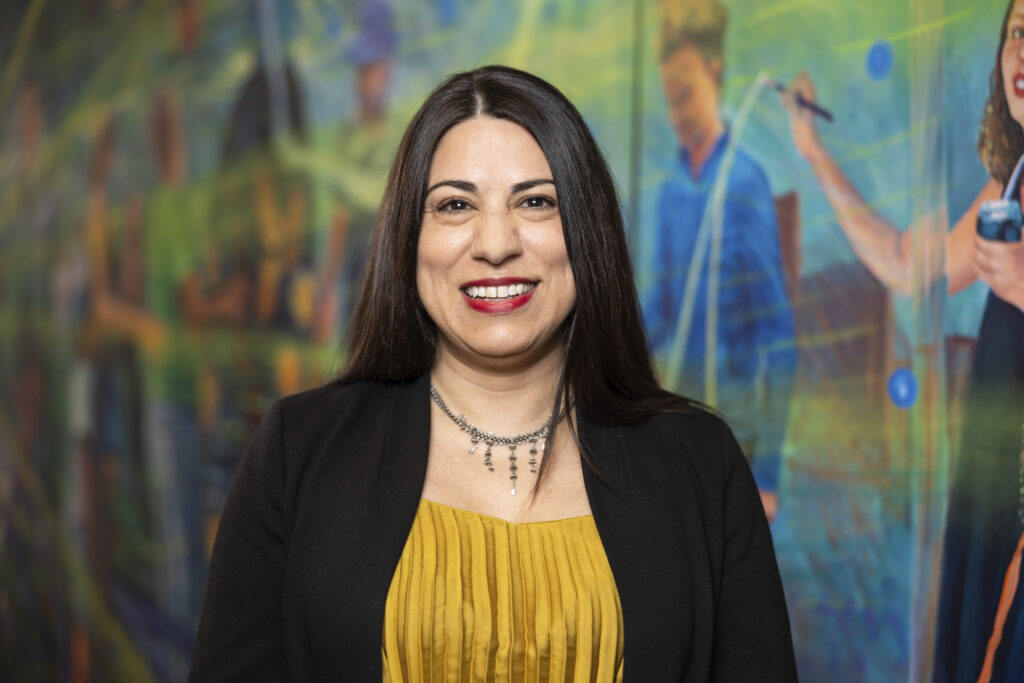Dr. Meghan Burke, associate professor and department chair of the Sociology Department at Illinois Wesleyan University, spoke about her new book, Colorblind Racism, at a talk Nov. 7 in O’Shaughnessy Educational Center.
On her campus, Burke co-developed and directs the Engaging Diversity pre-orientation program for incoming white students. The program allows students to explore white privilege and antiracism, so they can work as partners for social and racial justice.
Dr. Tanya Gladney, associate professor and chair of the Sociology and Criminal Justice program in the College of Arts and Sciences at St. Thomas, introduced Burke. The event was sponsored by the programs of sociology and criminal justice; English, American culture and difference, and others.
Here are five observations from Burke’s talk.
Being colorblind to someone’s race is racist.
Burke said her definition of racism is “a force that we learn, that we teach one another, that we enact in regular action (and inaction) and that produces dramatically unequal social outcomes.”
Some words and actions are easier to label racist; colorblind racism is not always that overt.
“For a white person to say to a person of color ‘I don’t think of you as black or brown’ – that’s not a compliment!” Burke said. “By pretending that we don’t see race, we don’t see the experiences that racism has created for people, and so we’re ignoring a totally central part of folks’ lived experiences. Dismissing the realities of race can perpetuate inequality and violence.”
Colorblind racism refers to ways of talking and thinking about race that affirms some of our beliefs.

Guest speaker and sociologist Dr. Meghan Burke from Illinois Wesleyan University speaks to students about her research and her book entitled “Colorblind Racism” during presentation in the O'Shaughnessy Educational Center auditorium on November 7, 2019. (Liam Doyle/University of St. Thomas)
One such belief is in individualism, which perpetuates the American Dream that says if you’re a success or a failure, it’s because of your talents, your hard work, your efforts. Sociologists and others say that theory is far from reality; “there remain systemic barriers and concrete acts of racism that still are holding people back and allocating privileges to white people like me in our society,” Burke said.
Another form of colorblind racism is to group people by their culture. It credits or blames someone’s culture for differences in outcomes, ignoring the many remaining barriers to equality that may prevent that individual from succeeding.
Most people have said or heard colorblind racist remarks.
Since colorblind racism is not always obvious, Burke offered some examples:
“It’s my grandparents’ generation that is racist. Today anyone can make it if they try hard enough.”
Burke said that all generations have expressed this sentiment. Because racism is something we learn from our families and communities, “there’s a lot of evidence that young people are enacting racism acts before kindergarten. So as WOKE as this generation is, I’m sorry to say there’s a lot of work to be done,” Burke explained.
“I don’t understand why people play the race card. Asian families seem to do just fine and it’s because they teach their kids the right values.” A statement like this trivializes racism and diminishes it by giving too much credence to a culture. Every new immigrant group puts a lot of pressure on their children to succeed in school, not just one culture, she said.
“All Lives Matter” is a pushback to Black Lives Matter, a movement calling attention to the “way in which black lives have been diminished through policing practices, through being devalued,” Burke said. “This reveals the degree to which anti-black racism, in particular, pervades our society. This false leveling is all a part of what’s going on in this colorblind contemporary racism.”
Midwesterners like to think that racism just exists “down south.”
Some northerners believe racism only exists in southern states. In reality racism isn’t confined to a specific region or area, but is prevalent throughout society. Burke asked, “Who’s in prison? Who’s in the neighborhoods where the schools are not well funded because the property values aren’t there?” Those aren’t issues only affecting southern states.
We need to recognize how racism is systemic.
Racism is embedded in our institutions and ideologies. Phrases such as “those people,” “that’s ghetto” or “that neighborhood is … sketchy” are ways of unfairly grouping people.
“Whiteness grants people individualism,” Burke said. “The social system gives me unearned advantages. That’s what privilege is about.”
She pointed out institutionalized enslavement of African Americans in the United States started in 1619. White people need to acknowledge how much of the past still impacts the present, and if we can’t do that, then we’re not going to be able to move forward.
There are some ways to work for racial justice and equity.
We all hold biases and have prejudices. We have the power to change that, and talking about race is a good place to start.
In Burke’s book Colorblind Racism, one of her suggestions is to consider our various spheres of influence: friends, religious communities, neighborhoods, workplaces, etc., and make a list of three tangible things we can do to create more racial justice in any one of those spheres. For example, if someone says something you’re skeptical about, dig in deeper and learn more about the subject.
The most important thing is to approach issues with cultural humility.
“Our goal should be working to end racial inequalities and forging genuine connections,” Burke said.
Resources Burke suggested:
- Racism Without Racists by Eduardo Bonilla-Silva
- White Fragility by Robin DiAngelo
- Dog Whistle Politics by Ian Haney López
- Should Schools be Colorblind? by Laurie Cooper Stoll







